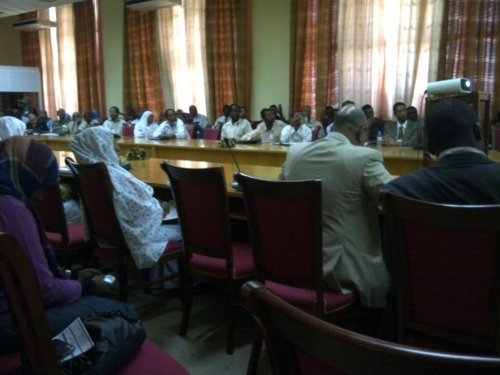Its 3.30am and I am sitting at Khartoum airport waiting for the flight back to Heathrow at the end of one of the most exacting yet rewarding weeks I’ve had in over 35 years of working across many continents.
Sudan challenges you: its people are warm, inquistive with an insatiable desire to learn. And yet time management is a work in progress and the ubiquitous presence of officialdom and the ongoing sanctions a significant drain on effectiveness and enthusiasm.
Despite these constraints the young are vibrant, highly intelligent and moved to laughter and song with little prompting. The society is very oral; stories are the currency of communication. External opinion is highly sought after and there is a work ethic that is both surprising and refreshing. By way of illustration:
It’s 5.45pm on the first day of Knowledge Management Capacity in Africa 2012 conference held in the Friendship Hall Khartoum. This inaugural event on Knowledge Management which kicked off at 8am has attracted over 500 delegates and nearly 50 international participants though I am the sole European. The timing has gone awry by some distance.
I get to my feet to begin my presentation entitled “missions and knowledge production” and having summoned water bottles and moved everyone around, ask the assembled throng in the Omduran Room what they want to do.

By a unanimous show of hands they indicate a desire to continue and we ultimately finish at 7pm in time for a Knowledge Cafe.
The audience listens attentively and I get a lot of positive feedback.
At the Knowledge Cafe I lead a ‘table’ of young Sudanese women who are keeping up the pace. The session eventually ends at 8.30pm some 12 hours after the day began. It is an indication of things to come over the following two days (and nights).
The Conference Chair Gada Kadoda, a woman of astonishing capacity and vision, has assembled an impressive array of speakers and presentations: from Washington to Malaysia via the UK with a big representation from Africa. I have two presentations to give and as it transpires to facilitate the closing conference session on Saturday morning before a caravan of minibuses sets off in search of the Sudanese Pyramids.
Over the next week or so I will be drawing on some of the conversations and highlighting examples of knowledge at work in Africa; for now here are some high level thoughts after 3 days of the conference.
- Technology I the ongoing sanctions means that some of the essential foundations for a dynamic knowledge society are absent. Software and hardware are in plentiful supply but access to the latest upgrades are restricted and effective support is difficult to come by even though maintance is included in the original purchase.
- e-commerce is constrained by the lack of an effective payment platform such as PayPal which is restricted. While the new regulators can plan for a time when the situation returns to normality by setting up the distribution network now, it means they are unable to encourage the growth of an industry that would facilitate a faster move towards a knowledge based economy. To illustrate the importance of e-commerce, figures just released show that over 30% of all purchases over the holiday period in the US were conducted online.
- Communications I the size of Sudan makes the laying of cable impractical; cell phone usage represents a high percentage of the communications media and some 22 million people have mobile devices (over 2/3 of the population).
- Knowledge (and information) sharing I ‘my data is my soul’ is a phrase oft repeated. It illustrates more than any other the challenges organisations face in encouraging professionals to part with what they know.
- Knowledge Management I is a discipline that’s attracting interest yet their are a fair share of cynics especially among those who seek substantive method and measurement. A number of prominent organizations have initiatives in train and like the citiens of many developing countries certification programmes are highly sought after. The term remains a deterrent for some and Knowledge Sharing was more readily endorsed.
- Collaboration I group work is an accepted part of the culture and there is no reluctance to act as the spokesperson for the group or in expressing ideas and opinions. Most people have a Facebook account of sorts yet few have heard of TripAdvisor!
- Food I plays a huge role in lubricating tongues. But everyone sits down at the first opportunity which tends to restrict conversation to those in the immediate circle.
- Stories travel I in the past the travellers (or Bedouin) were the custodians of stories, today that role is being increasing filled by online connectivity which places an emphasis on effective means of collection, storage and dissemination.
I had the pleasure of working alongside/talking to a number of Sudanese graduates and undergraduates a number of whom presented papers on Wednesday. Two in particular interested me: one was about a process of measuring the effectiveness of km in a private company; the other an annual attempt at knowledge transfer by the students to rural areas in which they’d identified and engaged with a local stakeholder who became their voice and ears.
Perhaps though the highlight was interacting with so many people for whom the sharing of knowledge is critical for survival; where information that stays in someone’s head or laptop might save lives; where different techniques are needed to get the stakeholder buyin and ensure sustainability.


